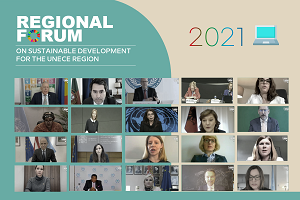How can the Sustainable Development Goals (SDGs) guide us to recover better? At the 2021 Regional Forum, more than 1,400 key stakeholders connected virtually during 7 days of action for the Sustainable Development Goals (SDGs). From 10-18 March 2021, changemakers from all parts of the UNECE region engaged in virtual discussions to move ahead with the 2030 Agenda on Sustainable Development in times of crisis. The space for interaction was broad: 12 peer learning sessions (10-16 March), 3 plenary sessions (17-18 March) and more than 25 side events and pre-meetings provided opportunities to engage with thought leaders from across the region and across sectors.
A watershed moment to recover better
UN Deputy Secretary-General Amina J. Mohammed referred in her opening speech to the need to leverage COVID-19 stimulus packages to “act with the same ambition and scale to achieve the SDGs and address the climate crisis.” She made a strong appeal to all participants that “we can turn this into a watershed moment to recover better, together.”
This year’s Regional Forum was co-chaired by Portugal’s Secretary of State for Foreign Affairs and Cooperation, Francisco André, and Romania’s State Counsellor to the Prime Minister, László Borbély.
Mr. André stressed that “the crisis should not be an excuse to interrupt policies but an opportunity to reaffirm our commitments including implementing the SDGs.” Giving a policy example from his country, he added: “Portugal has decided to extend the access to the national health service to all migrants and refugees regardless of their situation.” Mr. Borbély stated that “the best answer to the pandemic crisis is sustainable development. Solidarity and resilience is the only way to go ahead. That is why we have to cooperate better and strengthen the multilateral cooperation and partnerships within the UNECE region.”
More progress needed to meet the SDG targets
Summarizing the findings of the annual SDG Progress Report, UNECE Executive Secretary Olga Algayerova stressed: “On the basis of past trends, the region would achieve only 23 targets by 2030. Progress in 57 targets should accelerate. For 80 targets, almost half of the total, there is no sufficient national data to track change over time. Much progress is necessary therefore not only to meet the targets but also to improve data availability, including in countries with well-developed statistical systems.”
The keynote speaker Hans Kluge, WHO Regional Director for Europe, gave an overview of the current situation of the pandemic in the region and highlighted that “Seven countries and territories in the region have still not received a single dose of vaccines.” He added: “Commitments to equity and solidarity are in question.”
Closely linked to High-level Political Forum (HLPF)
Closely aligned with the issues addressed at the 2021 High-level Political Forum (HLPF), the virtual peer learning round tables were clustered around three themes (People, Prosperity, Planet) and focused on the nine SDGs under review at the 2021 HLPF. In these solution-oriented dialogues, a broad range of topics was explored, including: how can we scale up urgently needed climate action in times of crisis? What policies have proven effective to promote health and social protection, while co-existing with the virus? Country representatives and other stakeholders shared policy actions from their national experience, proposed solutions and discussed how best practices can be adopted by peers.
The outcomes of the peer learning round tables were reported back to the plenary sessions (17-18 March). During the Forum’s plenary sessions, country representatives also discussed how Voluntary National Reviews (VNRs) and Voluntary Local Reviews (VLRs) can serve as drivers of SDG implementation. The 2030 Agenda encourages member States to review their national experiences in implementing the SDGs, including successes, challenges and lessons learned. At the end of 2021, 55 out of the 56 UNECE member States will have carried out at least one VNR, demonstrating strong commitment to the 2030 Agenda.
Several pre-meetings channelled and coordinated the inputs of civil society, the private sector, parliamentarians and local governments to the Regional Forum. More than 20 side events offered further space for interactive discussions on current challenges.
Unprecedented numbers of participants and sessions
Taking place for the fifth time, the number of participants and sessions was unprecedented. The preparation of the Forum mobilized the regional UN system and exemplifies successful regional cooperation between a wide range of UN agencies. The Co-Chair’s summary of the Regional Forum will provide the region’s official input for the High-level Political Forum (HLPF).
Learn more about the Regional Forum 2021: https://regionalforum.unece.org/


